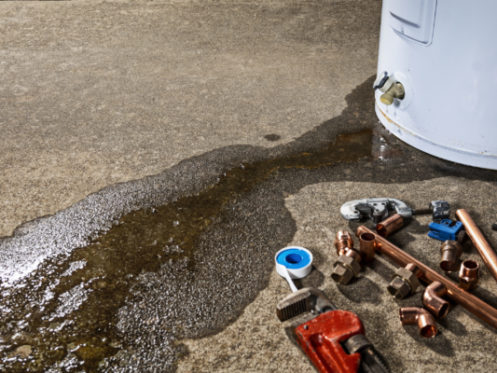Hard water refers to water that has a higher than average concentration of dissolved calcium and magnesium. Hard water is completely safe to drink even if hard water typically does have a somewhat strong mineral taste that many people find off-putting. The issue with hard water is that some of the dissolved minerals will always be left behind and start to form a hard, thick layer of limescale, and this has the potential to cause major issues with your home’s plumbing. Here is everything you need to know about hard water and the impact it can have on the longevity of your plumbing system.
Understanding Hard Water and the Issues It Can Cause
If your home has hard water, you have surely noticed the white mineral deposits left behind on your faucets and showerheads as well as the walls and doors of the shower. Over time, these mineral deposits can begin to clog up faucets and showerheads to the point where not nearly as much water can flow out. What you may not be aware of is that the exact same thing also happens inside all of your house’s pipes.
As water flows through the pipe, some of the mineral deposits are left behind and start to accumulate on the sides of the pipe. Over time, the layer of mineral deposits inside the pipe will continue to build and reduce the inside diameter of the pipe. As a result, less water will flow through the pipe at one time, which will start to lead to issues with low flow rates and greatly reduced water pressure. Unfortunately, there is no way to clean the limescale out of the pipes. This means the only option for fixing the issue and ensuring your plumbing system works effectively again is to replace all of the affected water lines.
Most homes use copper pipes for all the water lines, but some newer buildings use flexible polyethylene, or PEX piping, instead. Under normal circumstances, both copper and PEX piping should last for around 50 years. However, if your house has issues with hard water, it will often lead to the water lines only lasting half as long since they will start to become severely clogged with mineral deposits.
Hard water does not just shorten the lifespan of your water lines, but also almost all of your plumbing fixtures and appliances. Homes with hard water will need to replace their faucets and showerheads much more frequently. An even bigger issue is that mineral deposits will build up inside of your dishwasher and washing machine, and this can lead to issues with leaking and greatly shorten the lifespan of these appliances.
Hard water also has a huge effect on water heaters and will typically lead to greater maintenance and repair requirements and a shorter life expectancy. The issue here is that hard water causes sediment to build up inside the unit much more quickly, and this can impact how well the unit heats and how much energy it uses. Sediment can also create hot spots that weaken the water heater tank and cause it to corrode more quickly.
All water contains some dissolved minerals, and some of these minerals always harden and solidify as the water is heated. This process forms hard particles of sediment that settle at the bottom of the tank. Even in houses with hard water, it is important to have the water heater drained and flushed every year or so to remove the sediment so that it does not cause any issues. If your home has much harder water, you will typically need to have the unit flushed every few months since the sediment will build more quickly due to the higher mineral concentration.
Water Hardness in the Denver Area
Water hardness is determined by measuring the concentration of dissolved minerals in parts per million (ppm), specifically how much calcium and magnesium the water contains. The higher the concentration of minerals, the harder the water is. The USGS classifies water with a concentration under 60 ppm as soft, and anything above 180 ppm is considered very hard.
Water hardness varies quite a bit throughout the Denver metro area, and the reason for this is simply due to where the water company sources the water from. Homes that are supplied by Denver Water Utility typically have only moderately hard water, as the average concentration is only around 72 ppm. Arvada has quite hard water, as the typical concentration is around 160 ppm. If you live in the Aurora, Thornton, or Castle Rock areas, your house likely has very hard water, as the typical concentration in these areas is usually between 170 and 180 ppm.
How a Water Softener Can Prevent Hard Water Issues
The fact that the majority of the Denver area has hard to very hard water is why we would always recommend installing a water softener if your home does not already have one. Even if your house’s water is only moderately hard, mineral deposits will still collect the inside of your plumbing fixtures, appliances, and pipes. If your home has very hard water, the problem will obviously be more severe and lead to an even shorter lifespan for your plumbing.
The only way to prevent hard water from negatively impacting your plumbing is with a water softener. Most water softeners use a brine liquid and work using an ion exchange process. All of the dissolved minerals in the water carry a positive charge. The sodium ions in the brine are also positively charged, but they do not carry as strong of a charge as the mineral ions. Inside the water softener tank are thousands of tiny resin beads, and these beads are negatively charged.
The process of softening the water starts by flushing the tank with the brine. Since opposites attract, all of the positive sodium ions are attracted and stick to the negatively charged resin beads. Whenever new water enters the tank, the calcium and magnesium ions are attracted to the resin beads and take the place of the sodium ions. This process removes virtually all of the dissolved minerals, and the softened water then flows out of the tank, along with a very small amount of sodium. Since all of the minerals are removed and remain behind in the softener tank, you will no longer need to worry about limescale building up inside of your plumbing.
Each resin bead can only attract one mineral ion, which means that the tank needs to occasionally be flushed so that the resin beads can attract more minerals. During this process, brine is pumped back through the tank. This causes the resin beads to let go of the minerals, and the brine and all of the minerals are then flushed out and into a drain.
There are also brine-free water softeners, but these typically are not quite as effective. A brine-free water softener does not actually remove any minerals from the water. Instead, it simply changes the minerals in a way that they can no longer adhere to the inside of your pipes and other surfaces to prevent limescale from building up.
If you are looking to overcome your home’s hard water issues, Summit Heating & A/C is here to help. We install, service, and repair all types of plumbing appliances and fixtures. Our team can also take care of all of your other plumbing, heating, cooling, and electrical needs. Give us a call today if you have any questions or need to schedule any home service in the Denver metro area.


